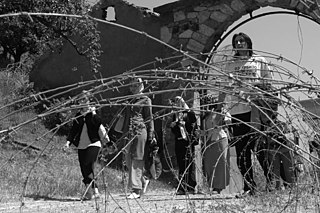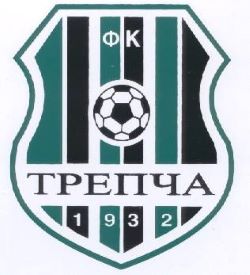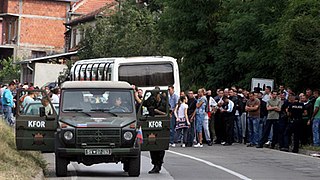
Mitrovica, also referred to as South Mitrovica, is a city in northern Kosovo and administrative center of the District of Mitrovica. In 2013, the city was split into two municipalities, South Mitrovica and North Mitrovica. Settled 10 km (6.2 mi) from Ujmani/Gazivoda Lake, on the confluence of the rivers Ibër, Sitnicë, Lushta, and Trepça, the city is surrounded by the mountains of Kopaonik, Rogozna, Mokna, and Çyçavica. According to the 2011 Census, the two municipalities had 97,686 inhabitants of which 85,360 reside in south and 12,326 in north.
The Podujevo bus bombing was an attack on a bus carrying Serb civilians near the town of Podujevë in Kosovo on 16 February 2001. The bombing killed twelve Serb civilians who were travelling to Gračanica and injured dozens more. Albanian extremists are suspected of being responsible for the attack. Gračanica is a predominantly Serb-populated town in central Kosovo, near the regional capital Pristina, in a predominantly Albanian-populated area. Following the Kosovo War in 1999 it became an enclave within Albanian-controlled territory. Relations between the two communities were tense and occasionally violent.

On 17–18 March 2004, violence erupted in Kosovo, leaving hundreds wounded and at least 19 people dead. The unrest was precipitated by unsubstantiated reports in the Kosovo Albanian media which claimed that three Kosovo Albanian boys had drowned after being chased into the Ibar River by a group of Kosovo Serbs. UN peacekeepers and NATO troops scrambled to contain a gun battle between Serbs and Albanians in the partitioned town of Mitrovica, Kosovo before the violence spread to other parts of Kosovo. Serbs call the event the March Pogrom, while the Albanians call it the March Unrest.

NorthKosovo ; also known as the Ibar Kolašin ; earlier Old Kolašin,, is a region in the northern part of Kosovo, generally understood as a group of four municipalities with ethnic Kosovo Serbs majority: North Mitrovica, Leposavić, Zvečan and Zubin Potok.

Fudbalski klub Trepča, commonly known as Trepča, is a Serbian football club based in North Mitrovica, in Kosovo. Despite being located in Kosovo, the club plays in the Serbian football league system, currently in the fourth tier Šumadija-Raška Zone League.

Widespread protests and riots in Serbia and North Kosovo followed the proclamation of independence by the Republic of Kosovo on February 17, 2008. Protests were also held by Serbs in Bosnia and Herzegovina and Montenegro.

The 2008 unrest in Kosovo followed Kosovo's declaration of independence on February 17, 2008. Some Kosovo Serbs opposed to secession boycotted the move by refusing to follow orders from the central government in Pristina and attempted to seize infrastructure and border posts in Serb-populated regions. There were also sporadic instances of violence against international institutions and governmental institutions, predominantly in North Kosovo.
Local elections were held in Kosovo on 11 May 2008, together with Serbia's parliamentary elections and elections in Vojvodina. UNMIK authorities have criticized Serbia organizing elections saying only the UN can organize elections in Kosovo. Kosovo's President Fatmir Sejdiu accused Serbia of trying to challenge Kosovo's statehood.

North Mitrovica or North Kosovska Mitrovica, is a town and municipality located in Mitrovica District in Kosovo. As of 2015, it has a population of 29,460 inhabitants. It covers an area of 11 km2 (4 sq mi).
Local elections were held in Serbia over two rounds on 3 November and 17 November 1996, concurrently with the 1996 Vojvodina provincial election. The first day of voting also coincided with the 1996 Yugoslavian parliamentary election and the 1996 Montenegrin parliamentary election. This was the third local election cycle held while Serbia was a constituent member of the Federal Republic of Yugoslavia and the last time that Serbia oversaw local elections throughout Kosovo and Metohija until its controversial decision to hold elections in 2008.

Clashes between the Republic of Kosovo and ethnic Serbs in northern Kosovo began on 25 July 2011 when the Kosovo Police crossed into the Serb-controlled municipalities of North Kosovo, to control several administrative border crossings. This was done without the Kosovo Police consulting either Serbia or Kosovo Force (KFOR)/EULEX. Though tensions between the two sides eased somewhat after the intervention of NATO's KFOR forces, they remained high amid concern from the European Union, which also blamed Kosovo for the unilateral provocation. On 19 April 2013, an agreement was signed in Brussels between representatives of Kosovo and Serbia. The 15-point document granted devolved powers to North Kosovo regarding economic development, education, healthcare and urban planning, and several mechanisms that allowed a certain autonomy in justice, policing and electoral matters.
An advisory referendum on accepting the institutions of the Republic of Kosovo was held in the Serb-dominated regions of North Kosovo on 14 and 15 February 2012. The referendum was held in Zubin Potok, Zvečan and Mitrovica on both days, while Leposavić voted on 15 February. The voting ran from 7:00 to 19:00 on both days. The result saw 99.74% of voters reject the writ of the Republic of Kosovo's institutions. The poll was rejected by the governments of both Serbia and Kosovo.

Serbian National Council of Kosovo and Metohija is an elected political and coordinating body acting as a representative of Serbs of Kosovo.

Local elections were held in Kosovo on 3 November 2013, with a second round on 1 December. These were the first elections which the Serbs of Northern Kosovo participated in since the Republic of Kosovo declared independence in 2008; polls were monitored by the OSCE. There were violent reactions in Serb-majority areas of northern Kosovo.

Oliver Ivanović was a Kosovo Serb politician.

The 2000 unrest in Kosovo was the result of the United Nations Interim Administration adopting Resolution 1244 on 10 June 1999. The unrest was fought between the Kosovo Force (KFOR), Kosovar Albanians, and Kosovar Serbs. It lasted somewhere from February 16, 2000 – June 6, 2000. An unknown number of Kosovar Albanians and Kosovar Serbs died along with an unknown number injured, while 1 Russian KFOR soldier died from shot wounds and UNMIK vehicles were burned during the unrest.
Krstimir Pantić is a Kosovo Serb politician. He served as mayor of northern Kosovska Mitrovica from 2010 to 2013. He was re-elected to the position following the 2013 Brussels Agreement but refused to take the formal oath of office as the document was in the name of the Republic of Kosovo, which Serbia does not recognize. He subsequently served in the National Assembly of Serbia from 2014 to 2016 as a member of the Serbian Progressive Party.
Dragiša Milović is a Kosovo Serb politician. He was the mayor of Zvečan, a predominantly Serb community in the disputed territory of Kosovo, from 2002 to 2013, serving as a member of the Democratic Party of Serbia (DSS). In 2021, he was re-elected to the same position as a candidate of the Serb List (SL).
Milan Ivanović is a Kosovo Serb medical doctor, administrator, and politician. He was a prominent figure in northern Kosovo politics for the first decade after the 1998–99 Kosovo War. Ivanović was for many years the leader of the Serbian National Council of Northern Kosovo and Metohija and has been a vocal opponent of engagement with the post-1999 governing authorities in Priština. He is no relation to the late Oliver Ivanović.
Radenko Nedeljković is a Kosovo Serb politician. He was the Serbian government's municipal coordinator for Kosovska Mitrovica from 2007 to 2008 and leader of the Kosovska Mitrovica District from 2008 to 2013. In the latter role, he helped to oversee the Serb community's response to the 2011–13 North Kosovo Crisis. For most of his time in office, he was a member of the Democratic Party (DS).












